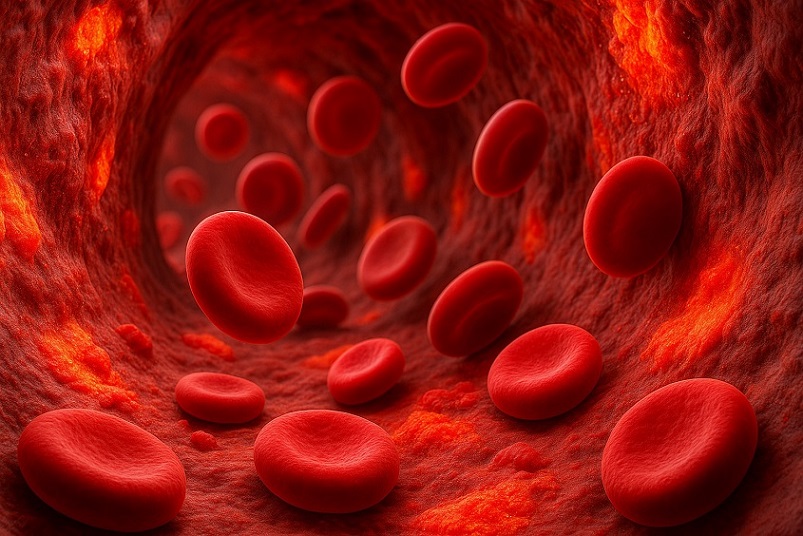Scientists Warn That COVID-19 Vaccines Damage Blood Vessel Linings and Cause Multisystem Inflammation
Nikhil Prasad Fact checked by:Thailand Medical News Team Aug 13, 2025 6 months, 1 day, 1 hour, 35 minutes ago
Medical News: Growing Concerns Over Post-Vaccination Syndrome
A major new review by researchers from Semmelweis University in Hungary, Sungkyunkwan University in South Korea, the Hungarian University of Sports Science, and New York Medical College warns that mRNA COVID-19 vaccines such as Pfizer-BioNTech’s Comirnaty and Moderna’s Spikevax may trigger a broad range of inflammatory conditions by damaging the body’s microcirculatory system. While these vaccines were claimed to be vital during the pandemic, reports of rare but serious side effects—collectively referred to as post-vaccination syndrome (PVS)—have prompted closer scrutiny of their mechanisms. This
Medical News report examines their findings.
 Scientists Warn That COVID-19 Vaccines Damage Blood Vessel Linings and Cause Multisystem Inflammation
How Inflammation Spreads Across the Body
Scientists Warn That COVID-19 Vaccines Damage Blood Vessel Linings and Cause Multisystem Inflammation
How Inflammation Spreads Across the Body
The study highlights that lipid nanoparticles (LNPs) carrying the mRNA enter the bloodstream soon after injection and can be taken up by endothelial cells—the thin layer of cells lining blood vessels in all organs. Once inside, the mRNA instructs these cells to produce the SARS-CoV-2 spike protein, which may trigger immune responses similar to those caused by actual infection. This can result in local or widespread vascular inflammation, known as endothelitis, which has been linked to myocarditis, hepatitis, kidney damage, neurological disorders, and more.
Organ-specific differences in microcirculation help explain why symptoms vary between individuals. For example, the heart’s dense capillary network makes it more susceptible to myocarditis, while the brain’s tight blood–brain barrier can lead to focused neurological issues like optic neuritis or Guillain–Barré syndrome. The lungs, kidneys, and liver are also vulnerable due to their specialized capillary structures, allowing inflammatory molecules to spread rapidly within these organs.
Possible Root Causes
The researchers identify several design features of mRNA vaccines that may contribute to these inflammatory complications, including the chemical structure of the mRNA, the proinflammatory properties of the LNPs, and the stabilization of the spike protein despite its known toxicity. They also note that immune system reactivation—such as complement activation and cytotoxic T-cell attacks—can damage endothelial cells further.
The review points to experimental evidence showing spike protein in the cerebral arteries of vaccinated individuals up to 17 months later, suggesting long-term persistence of the antigen. This prolonged exposure could underlie ongoing symptoms in some patients with PVS.
Why This Matters for Future Vaccines
Although the overall risk for an individual remains low, the sheer number of vaccinations given worldwide means that even rare complications can affect many people. The researchers stress that understanding these mechanisms is c
rucial for developing safer mRNA vaccines and other therapeutic uses of this technology. They also call for more research into why only some people develop severe reactions, which could lead to targeted preventive measures.
The study findings were published in the peer reviewed journal: Vaccines.
https://www.mdpi.com/2076-393X/13/8/855
For the latest vaccine news, keep on logging to Thailand
Medical News.
Read Also:
https://www.thailandmedical.news/news/japanese-study-uncovers-why-the-covid-19-vaccinated-are-more-vulnerable-to-reinfection-or-breakthrough-infections
https://www.thailandmedical.news/news/sars-cov-2-disrupts-eosinophils-while-covid-19-vaccines-cause-eosinophilia-and-induce-immunopathogenicity
https://www.thailandmedical.news/news/hungarian-researchers-warn-that-covid-19-mrna-vaccines-are-causing-serious-kidney-damage-and-glomerular-issues
https://www.thailandmedical.news/articles/vaccine-news
